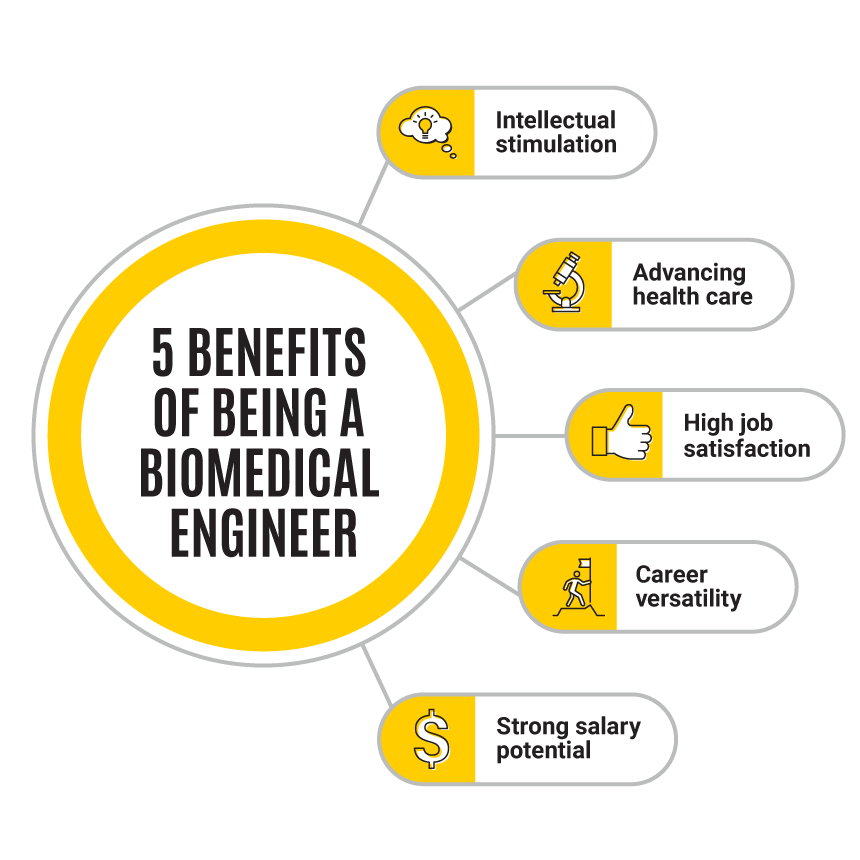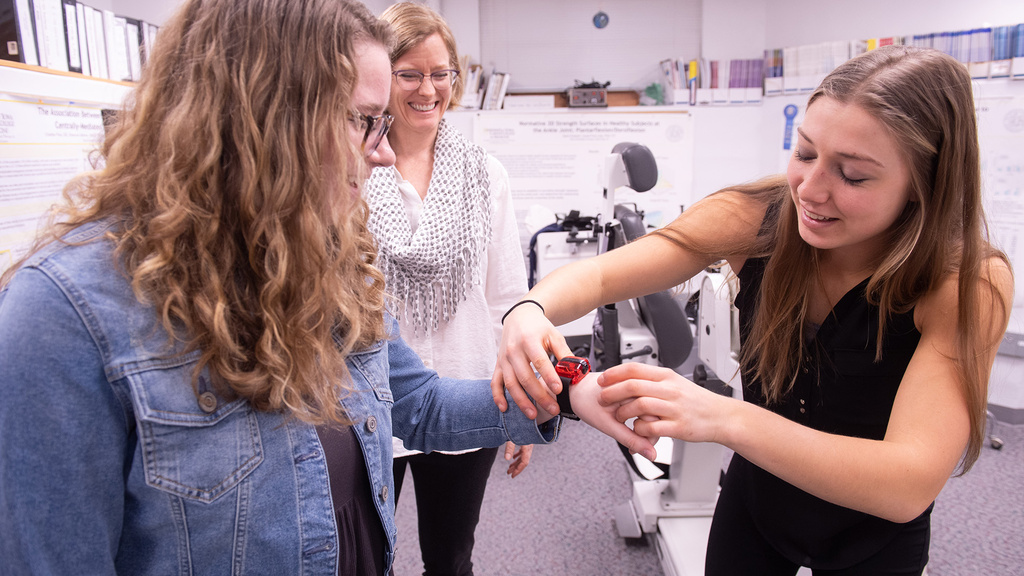Explore how biomedical engineers blend tech and health care to design life-changing innovations — from 3D bioprinting to digital tattoos.
If you’re passionate about health care and technology, the field of biomedical engineering offers myriad opportunities to design solutions that improve lives. But what kind of jobs can you get with a biomedical engineering degree, and how do you get started?
Let’s look at the types of positions, salaries, and steps you can take to launch a career in biomedical engineering.
What jobs can you get with a biomedical engineering degree?
Whether you’re interested in research, developing innovative medical solutions, or working directly with health care professionals, there’s a biomedical engineering job for you.
Depending on the type of biomedical engineering you pursue, some jobs you might consider include:
- Clinical engineer: Make sure hospitals run smoothly with the latest tech.
- Instrumentation engineer: Develop new equipment and software used in the creation and production of medical devices.
- Manufacturing engineer: Develop and refine processes for manufacturing medical devices or products so they can be marketed.
- Medical device designer: Build tools that save lives, from pacemakers to robotic surgery systems.
- Quality engineer: Ensure that medical devices meet FDA standards for safety and efficacy.
- Regulatory affairs specialist: Help bring new medical products to market safely and legally.
- Rehabilitation engineer: Design, build, and adapt technology to help people with disabilities increase their functional abilities and independence.
- Research and development (R&D) engineer: Work in labs to invent the next big thing in biotech or pharma.
- Software engineer: Responsible for the analysis, design, programming, debugging, and modification of software applications and testing solutions.
“The field of biomedical engineering continues to evolve quickly with advances in AI, wearable tech, and personalized medicine,” says Nicole Grosland, associate dean for academic programs and distinguished professor in the University of Iowa College of Engineering. “3D bioprinting, for example, is revolutionizing regenerative medicine, while digital tattoos provide a way to continuously monitor vital signs. The opportunities are endless.”
What are 8 types of biomedical engineering?
To be perfectly honest, there are more than eight types of biomedical engineering — many more. Biomedical engineering is a broad and interdisciplinary field that is constantly evolving alongside advances in medicine, biology, and technology.
But some of the more common types of biomedical engineering include:
- Bioinformatics and computational bioengineering
- Bioinstrumentation
- Biomaterials
- Biomechanics
- Cell and tissue engineering
- Clinical engineering
- Medical imaging, biomedical imaging, bioimaging
- Rehabilitation engineering
Each type of biomedical engineer focuses on a unique area and is employed in a very different job. All these options give you the flexibility to align your education with your passions and professional goals.
“Once you’ve decided on biomedical engineering, keep an open mind. Think about what excites you. Do you like coding? Mechanics? Biology?” Grosland says. “These interests will help guide your exploration. Also consider job prospects and whether you want to work in industry, research, or health care.”

What is the best job for a biomedical engineer?
There is no one “best job” for a biomedical engineer.
When deciding what the best job for you is, keep some of these things in mind:
Personal interests
Do you love solving technical problems? Maybe you should look for a job in research and development. Do you prefer working with people? Clinical engineering might be a great fit. Want to design the next generation of prosthetics that integrate sensors for better control and feedback? Then you should look for a job as a rehabilitation engineer.
Skills and strengths
What are you strongest in? Coding? Design? Biology? Communication?
Work style
Do you prefer working by yourself or in a team? Do you thrive in a fast-paced environment or need a more laid-back setting?
Location
Some regions have more opportunities in certain types of biomedical engineering than others. Are you open to moving or want to stay where you are? Some roles, such as those in data analysis or regulatory affairs, may offer remote options.
Salary and benefits
You’ll want to compare salaries for your desired role and location, along with benefits such as health insurance, retirement plans, professional development support, and personal time off.
What biomedical engineering jobs pay the most?
As technology continues to transform medicine, the demand for skilled biomedical engineers has surged — bringing with it varied career opportunities and a range of salaries.
According to the U.S. Bureau of Labor Statistics, the median annual salary for biomedical engineers in the United States was $106,950 in 2024. This is significantly higher than the median salary for all U.S. occupations, which hovers around $49,500.
Among job titles for positions related to biomedical engineering degrees, these positions have a mean annual wage in the top 25:
- Biochemical engineer
- Biomechanical engineer
- Biomedical engineer
- Process development engineer
- Research biomedical engineer
- Research engineer
- Yield improvement engineer
As in any field, there are factors that can increase how much you earn as a biomedical engineer. These can include experience, taking on a management position, and, sometimes, having an advanced degree, such as a master’s degree or PhD.
Is biomedical engineering a good career?
Absolutely.
For people who are passionate about science, technology, and health care, biomedical engineering is a great career choice.
Biomedical engineers report above-average happiness with their jobs, often linked to the meaningful nature of their work. According to a study by CareerExplorer, biomedical engineering is in the top 40% of careers for career satisfaction.
Furthermore, biomedical engineers are increasingly in demand, and the trend is expected to continue. The U.S. Bureau of Labor Statistics projects a 5% growth in employment for biomedical engineers between 2024 and 2034, faster than the average for all occupations.
Getting a degree in biomedical engineering also offers flexibility. If you decide at some point that biomedical engineering is no longer a field you want to work in, you’ll find that your technical, critical thinking, and problem-solving skills will serve you well in other fields, including public health, medicine, business, and other types of engineering.

How do I start a career in biomedical engineering?
The biomedical engineering field may be growing, but landing a job can be competitive. To begin with, you’ll need to earn a bachelor’s degree in biomedical engineering or a related field, such as electrical or mechanical engineering. Some biomedical engineering positions may require an advanced degree, such as a master’s degree or PhD.
However, success often depends on more than just getting your degree. Here are a few things you can do as a student that can make a difference:
- Get an internship: Hands-on experience is key. Many employers look for candidates who have previously worked in labs, hospitals, or industry settings.
- Participate in research: This can help you prepare for your postgraduation plans by developing crucial skills such as problem-solving abilities and critical thinking, building professional relationships, and boosting graduate school applications.
- Network: Building connections with professors, alumni, fellow students, and professionals in the field can open doors.
When choosing a college or university for biomedical engineering, look at what resources it offers to help students find internships, participate in research, or write résumés and cover letters. For example, University of Iowa College of Engineering students can tap into knowledge from faculty and staff through Engineering Career Services, Undergraduate Research Opportunities, and the Hanson Center for Communication, among others. They also benefit from a strong partnership between the engineering college and the University of Iowa Carver College of Medicine and University of Iowa Health Care.
Related content

Is it hard to find a job with a biomedical engineering degree?

Is biomedical engineering a good career?

